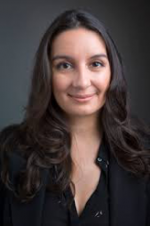
April 20, 2019, NEW YORK -- Sarah Mehta joins Columbia Law School’s Human Rights Institute and Human Rights Clinic as the TrialWatch Legal Fellow, where she is working to develop and implement a new international trial monitoring project.
“We are thrilled to welcome Sarah Mehta to the Human Rights Institute and Clinic,” said Professor Sarah Knuckey, faculty co-director of the Human Rights Institute and director of the Human Rights Clinic. “She brings a rich combination of skills in litigation and fact-finding, and as the Legal Fellow, she will lead trial monitoring, training, global engagement, and research and advocacy efforts. She also brings immense experience to her role in the Human Rights Clinic, where she supervises and trains Columbia students on human rights advocacy strategy.”
The TrialWatch initiative monitors and responds to trials that pose a significant risk of human rights violations, with a particular focus on cases where may be used as a tool to oppress vulnerable groups, to silence speech, or to target political opponents or critics. Mehta believes this program can support communities to “expose how legal systems around the world can be used to punish—instead of support—people advocating for their human rights.”
“I am excited to contribute to TrialWatch, a new initiative to monitor on trials around the world in order to expose and rectify injustice done by courts,” Mehta said. “There is a global community-building and knowledge-sharing component at the core of the TrialWatch project that is inspiring and ambitious.”
Implemented in partnership with the Clooney Foundation for Justice, the TrialWatch project aims to strengthen the global community of trial monitors and advocates, engage in research on how to best leverage trial monitoring data, and pursue the creation of an innovative, data-driven ‘global justice index’ that ranks states’ performance. The project partners with Microsoft and the American Bar Association to leverage technology and international networks to deploy trial monitors to courtrooms all over the world.
In its first year, the Columbia Human Rights Clinic’s TrialWatch team monitored trials in Zambia and Turkey and collaborated with local law students to continue monitoring the cases; participated in the drafting of two reports on the fairness of those trials, working with international human rights experts; tested the monitoring technology and provided feedback to TrialWatch partner Microsoft; provided research on global trends in the prosecution of women and girls; and helped to develop all of TrialWatch’s protocols for monitoring, report-writing, collaborating with local partners, and grading trials. Mehta has worked to develop institutional partners from civil society and law schools across the world to support TrialWatch’s goal of scaling up trial monitoring by lawyers and non-lawyers working in their own communities.
Before joining the TrialWatch Project, Mehta worked at Human Rights Watch and, from 2010-2018, with the American Civil Liberties Union's (ACLU) as a human rights researcher and a litigator. In her years at the ACLU, she worked primarily on immigrants' rights and criminal justice reform through litigation, investigations and legislative advocacy on issues including the Muslim Ban, access to counsel in deportation proceedings, parole reform, and prison conditions. She also represented the ACLU on migrants’ rights before international human rights bodies and worked as a trial monitor for the military commission proceedings at Guantánamo Bay.
“Working in the U.S., I've seen how even deeply harmful court decisions are rationalized and sanitized as the result of a ‘valid process’ with no acknowledgement of how corrupted those processes are,” Mehta explains. “Without trial monitoring and real investigation into these legal proceedings, governments have been able to launder their mistreatment of critics and minorities through the judicial system.”
Mehta is a graduate of Yale Law School (2009) and Brown University (2003), where she majored in Development Studies and South Asian Studies. She was previously the Aryeh Neier Fellow at Human Rights Watch and the ACLU (2009-2011) and was a Fulbright Scholar in India (2005-06), where she worked on Muslim women's access to public health and education services.
# # #
The Human Rights Institute advances international human rights through education, advocacy, fact-finding, research, scholarship, and critical reflection. We work in partnership with advocates, communities, and organizations pushing for social change to develop and strengthen the human rights legal framework and mechanisms, promote justice and accountability for human rights violations, and build and amplify collective power.
The Columbia Law School Human Rights Clinic works to advance human rights around the world, and to train the next generation of strategic advocates for social justice. The Clinic works in partnership with civil society organizations and communities to carry out human rights investigations, legal and policy analysis, litigation, report-writing, and advocacy.
Join us on Facebook: Columbia Law School and Human Rights Institute
Follow us on Twitter: @columbialaw and @CLSHumanRights
